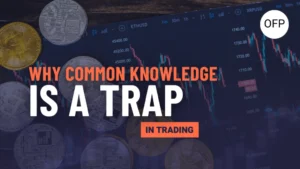In the world of trading, most investors are on the lookout for trends, patterns, and information that will give them an edge. Yet, there is a significant trap that many traders fall into: common knowledge. Relying on common beliefs and widely available information can seem safe, but in reality, it can severely limit success in the markets. Understanding why common knowledge in trading can be a dangerous pitfall will help traders avoid being deceived.
Table of Contents
- Why Common Knowledge in Trading is a Trap ?
The Trap to Avoid at All Costs
Common knowledge in trading can definitely be a trap because there are many participants in the market. Most of us are regular traders with no ability to affect the market. This is because our capital is not enough to influence large markets. However, there are some who can affect prices and influence the market. This is the game of large institutions. They can create false momentum and trap traders.
Who is the Winner? Who is the Loser?
Common knowledge in trading is a trap, and here’s why: It’s a bold statement, but it holds true because the market is a zero-sum game. A trader buys from sellers and sells to buyers, meaning a trader needs someone to take the opposite position at the same time. In this sense, you succeed at the expense of another person. If you make a profit, that profit is someone else’s loss.
What is This So-Called Common Knowledge?
Common knowledge refers to the ideas found in YouTube videos, broker websites, and similar sources. These ideas are targeted at beginners entering the world of trading. It typically includes concepts like Fibonacci, trendlines, pivots, and moving averages (such as the 200 or 100). However, this “knowledge” for beginners rarely works, if it did, everyone would be making a fortune, but that’s not the case.
The Secrets of the Pros
One of the main secrets that hedge funds, banks, and other institutions use is occasionally allowing common knowledge strategies to work in their favor. They can then repeatedly cash in on these strategies, creating the false illusion that common knowledge strategies consistently work. However, if you don’t have enough capital to influence prices, you are entirely subject to the moves of those who do.
Logic Might Be the Reason You Lose
One reason strategies can fail is that there are thousands of different forms of logic in the market, many of which contradict each other. Some strategies, like momentum trading, aim to catch a moving market, while others focus on intercepting reversals. The same strategy can also perform differently when applied to various timeframes. These countless participants, create an unpredictable system where relying too heavily on logic alone can lead to losses.
The Uncertainty of Logic in Trading
Many traders will tell you that behind every good strategy lies at least a small amount of logic. This claim seems obvious, why would anyone trade the markets without a reasonable way to understand them, right? But logic is always unstable. No one can be certain of what they see in the market, as the market itself is not constant and is always changing. Remember to always keep your risk management in check, and don’t let emotions cloud your judgment.





